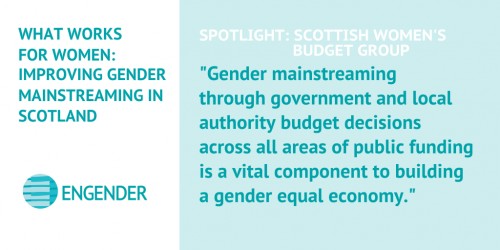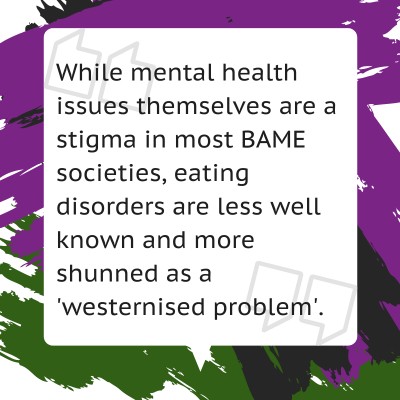Engender blog
All of Engender’s latest news. Reports, reviews, books, articles, and information from across Scotland’s women’s sector.
We would love to hear from other feminists around Scotland. Check out our guidelines for more information on how you can blog for us.
Guest Post: Mainstreaming Spotlight - Scottish Women's Budget Group
To mark the release of Engender's new report, What Works for Women: Improving gender mainstreaming in Scotland, we're sharing how mainstreaming is important to the work of some of Scotland's equalities organisations. Here, Sara Cowan from the Scottish Women's Budget Group talks about how mainstreaming is a vital component of creating a gender equal economy.

Why is gender mainstreaming important to your organisation?
Women and men use public services differently – they have different life experiences and face different economic realities and challenges. Women are often disadvantaged by policies that do not recognise these different experiences. Gender mainstreaming is important to us to redress this balance when decisions are made across a range of public services.
What area(s) of mainstreaming are you focused on?
We’re concerned with how public finances are spent and how budgetary decisions can work to reduce gender inequality. Gender mainstreaming through government and local authority budget decisions across all areas of public funding is a vital component to building a gender equal economy.
If you could snap your fingers and change one thing to make gender mainstreaming happen, what would it be?
Comprehensive equality impact assessments would be conducted for all budgetary decisions by local and national Government.
Where can people find out more about your work on mainstreaming?
Find out more about our work and become a member online here. We're also hosting two 'Introduction to Gender Budgeting' webinar sessions, one on 10th December from 9.30am-11.30am, and another on 15th December from 7pm-9pm - you can sign up for whichever session works best for you here.
Guest Post: Mainstreaming Spotlight - CRER
To mark the release of Engender's new report, What Works for Women: Improving gender mainstreaming in Scotland, we're sharing how mainstreaming is important to the work of some of Scotland's equalities organisations. Here, Carol Young from the Centre for Racial Equality and Rights (CRER) talks about how they use an intersectional approach in their mainstreaming work.
Why is gender mainstreaming important to your organisation?
While CRER is an anti-racist organisation and our work is primarily focused on race equality, we adopt an intersectional approach where possible. People’s identities are multifaceted, and everyone has multiple protected characteristics, so it's not feasible to get mainstreaming right for one characteristic without considering the others.
-500.png)
What area(s) of mainstreaming are you focused on?
We focus on all aspects of mainstreaming, with particular attention to race. We produce guidance for public bodies on the Public Sector Equality Duty (PSED), which includes mainstreaming activity. We previously delivered an in-depth Mainstreaming Equalities Organisational Development Programme for voluntary sector leaders, along with our partners at GCVS.
If you could snap your fingers and change one thing to make gender mainstreaming happen, what would it be?
We would want public bodies to have a better evidence base and to use the evidence they gather in mainstreaming equality. If public bodies produced detailed intersectional data, this would aid identification of gaps in equality mainstreaming and allow targeted interventions. Inequalities for minority ethnic women are worse than for minority ethnic men on most issues, but the situation varies widely between different ethnicities. The more detail, the better!
Where can people find out more about your work on mainstreaming?
You can find out more about our work on mainstreaming by looking at the publications section on our website. We also maintain a PSED portal which outlines the reports and data published under the public sector equality duties by public bodies in Scotland.
GUEST POST: Mainstreaming ambition
Louise Macdonald, OBE, is the co-chair of the First Minister's National Advisory Council on Women and Girls. The focus of the Council this year is 'gender architecture', a key part of mainstreaming gender. To mark the launch of our report What Works for Women: improving gender mainstreaming in Scotland, we asked Louise to blog for us on the work of the council during 2020.
Making gender inequality a historical curiosity is an ambitious vision – but sadly a necessary one.
The First Minister’s National Advisory Council on Women and Girls was established by Nicola Sturgeon in 2017 to help achieve that – with the aim of offering her insight and advice on how to tackle gender inequality at a systemic level.
The issues that the members of our NACWG Circle raised at our inaugural event that year were not new – we listened carefully to what they told us and designed our initial three year strategy to strategically address these issues through a whole-systems lens.
F-words: Finn McKay on gender ideology
Dr Finn Mackay is a sociology lecturer at the University of the West of England in Bristol and author of ‘Radical Feminism: Feminist Activism in Movement’. Here, ahead of the release of her new book 'Female masculinities & the gender wars’, Dr Mackay explores the term ‘gender ideology’ and what it means for feminism in the UK.
-400.png)
What is gender ideology?
The term “gender ideology” is not new (Graff & Korolczuk, 2018).This language began to be used by the Catholic church in the mid 1990s, for example in Beijing at the fourth World Conference for Women. Pope John Paul II wrote to the UN Secretary General, emphasising the natural complementarity of men and women, masculinity and femininity, and restating that the sexes are equal, but different. Catholic education guides warn against gender ideology, which they see as indoctrinating children into viewing sexuality, gender and sexed identities as fluid or influenced by personal choice. In the US, right-wing, Christian evangelical groups like the Family Research Council, label gender ideology as the third wave of attack against the heterosexual nuclear family; the first wave being the women’s liberation movement and the second being the gay liberation movement (O’Leary & Sprigg, 2015). The term is an evocative enemy, and platforms set up to oppose it can stand for traditional family values, separate sphere gender roles and nationalism. Activism against “gender ideology” has become a shorthand, and successfully unites many who are against abortion, women’s rights, equal marriage, LGBTQI+ rights, divorce rights or immigration for example.
GUEST POST: Food for thought
Dr Shridevi Gopi-Firth is a Speciality Doctor in Eating Disorders working in Scotland. Her international education and career, including third sector work across India, Russia and the UK have given Shri a wide exposure to diverse cultural, social, educational and healthcare settings, thus successfully complementing her lived experience and clinical skills to develop a holistic understanding of the person. Here, she explores how stigma around eating disorders can affect women in BAME communities.

Eating – the most basic need of all things living, from the prokaryotic amoeba to the Dalai Lama. So when this signal in the brain gets scrambled and the eating becomes disordered, the inevitable reaction of the general populace is confusion, indignation, frustration and pity – empathy is a far way off since one cannot truly understand what causes a person to turn away from this basic need. This is never more pronounced than in Asian and African cultures where food brings people together and is the centre of every festival and get-together, big and small. Food is serious business in these cultures – I mean, in Asia alone, there are several deities devoted to food, the growing of it, the eating of it, the digesting of it, the gifting of it – one does not mess around with the concept of food!
Downloads
 Engender Briefing: Pension Credit Entitlement Changes
From 15 May 2019, new changes will be introduced which will require couples where one partner has reached state pension age and one has not (‘mixed age couples’) to claim universal credit (UC) instead of Pension Credit.
Engender Briefing: Pension Credit Entitlement Changes
From 15 May 2019, new changes will be introduced which will require couples where one partner has reached state pension age and one has not (‘mixed age couples’) to claim universal credit (UC) instead of Pension Credit.
 Engender Parliamentary Briefing: Condemnation of Misogyny, Racism, Harassment and Sexism
Engender welcomes this Scottish Parliament Debate on Condemnation of Misogyny, Racism, Harassment and Sexism and the opportunity to raise awareness of the ways in which women in Scotland’s inequality contributes to gender-based violence.
Engender Parliamentary Briefing: Condemnation of Misogyny, Racism, Harassment and Sexism
Engender welcomes this Scottish Parliament Debate on Condemnation of Misogyny, Racism, Harassment and Sexism and the opportunity to raise awareness of the ways in which women in Scotland’s inequality contributes to gender-based violence.
 Gender Matters in Social Security: Individual Payments of Universal Credit
A paper calling on the Scottish Government to automatically split payments of Universal Credit between couples, once this power is devolved to the Scottish Parliament.
Gender Matters in Social Security: Individual Payments of Universal Credit
A paper calling on the Scottish Government to automatically split payments of Universal Credit between couples, once this power is devolved to the Scottish Parliament.
 Gender Matters Manifesto: Twenty for 2016
This manifesto sets out measures that, with political will, can be taken over the next parliamentary term in pursuit of these goals.
Gender Matters Manifesto: Twenty for 2016
This manifesto sets out measures that, with political will, can be taken over the next parliamentary term in pursuit of these goals.
 Scottish NGO Briefing for UN Special Rapporteur on Violence Against Women
Joint briefing paper for the UN Rapporteur on Violence Against Women.
Scottish NGO Briefing for UN Special Rapporteur on Violence Against Women
Joint briefing paper for the UN Rapporteur on Violence Against Women.

Newsletter
Sign up to receive our newsletter here:
Sign up to our mailing list
Receive key feminist updates direct to your inbox: